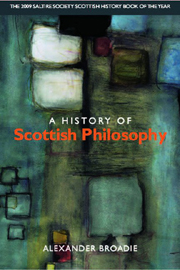Book contents
- Frontmatter
- Contents
- Acknowledgements
- 1 Introduction
- 2 John Duns Scotus
- 3 The Fifteenth Century
- 4 The Circle of John Mair
- 5 Humanism and After
- 6 Scotland Moves into the Age of Enlightenment
- 7 David Hume
- 8 Adam Smith
- 9 The Scottish School of Common Sense Philosophy
- 10 The Nineteenth Century: Ferrier to Seth
- 11 Realism and Idealism: Some Twentieth-century Narratives
- 12 Conclusion
- Bibliography
- Index
11 - Realism and Idealism: Some Twentieth-century Narratives
Published online by Cambridge University Press: 12 September 2012
- Frontmatter
- Contents
- Acknowledgements
- 1 Introduction
- 2 John Duns Scotus
- 3 The Fifteenth Century
- 4 The Circle of John Mair
- 5 Humanism and After
- 6 Scotland Moves into the Age of Enlightenment
- 7 David Hume
- 8 Adam Smith
- 9 The Scottish School of Common Sense Philosophy
- 10 The Nineteenth Century: Ferrier to Seth
- 11 Realism and Idealism: Some Twentieth-century Narratives
- 12 Conclusion
- Bibliography
- Index
Summary
Section 1: Introduction
Writing in the 1950s John Passmore affirms: ‘[A]t the Scottish universities, particularly, Idealism is still the predominant tendency in philosophy.’ He thereupon mentions representative works by three leading figures: Scepticism and Construction (1931) by Charles A. Campbell, professor of logic and rhetoric at Glasgow; The Natural History of Mind (1936) by Arthur D. Ritchie, professor of logic and metaphysics at Edinburgh (and son of D. G. Ritchie, professor of logic and metaphysics at St Andrews from 1894 to 1903, and a relative also of David Ritchie, who had been Sir William Hamilton's predecessor in the chair of logic and metaphysics at Edinburgh); and The Boundaries of Science (1931) by John Macmurray. Passmore also refers in this context to Donald M. MacKinnon, a native of Oban, who was regius professor of moral philosophy at Aberdeen (1947–60) before occupying the Norris Hulse chair of divinity at Cambridge (1960–76); in the 1940s and 1950s MacKinnon published several articles of an idealist hue. Passmore had previously spoken also of Norman Kemp Smith as an idealist of sorts, pointing as evidence to Kemp Smith's Prolegomena to an Idealist Theory of Knowledge (1924). Mention might also have been made of William D. Lamont, reader in philosophy at Glasgow, whose writings, including Introduction to Green's Moral Philosophy (1934) and The Principles of Moral Judgement (1946), are of a strongly idealist bent.
These thinkers were all major representatives of Scottish philosophy up to the end of the 1950s and were alive at the time Passmore was passing judgment on the predominant tendency then discernible in Scotland's universities. A case can be made out that all were idealists of sorts, though, of course, it would be necessary to say what is meant by ‘idealist’, for they were not all idealists in an equally tough sense – far from it.
- Type
- Chapter
- Information
- A History of Scottish Philosophy , pp. 324 - 364Publisher: Edinburgh University PressPrint publication year: 2008



